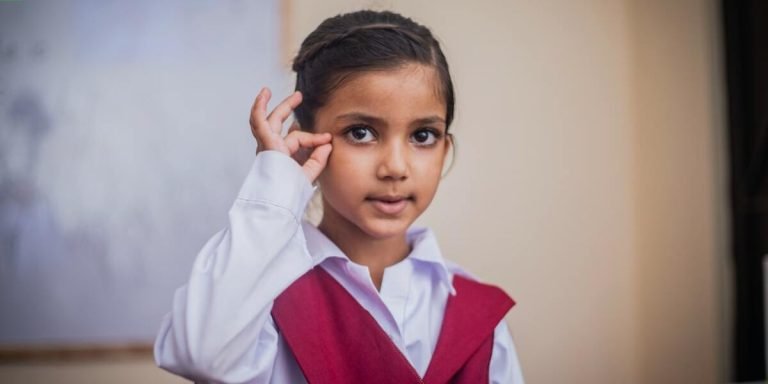Interesting Facts About Children That Illuminate Their World of Learning and Development
Unraveling the captivating and intriguing sphere of early childhood education begins with understanding some interesting facts about children. Their unique behaviors, cognitive abilities, and developmental milestones all contribute to their learning journey in a profound way. These fascinating insights serve as building blocks for educators and parents alike to develop successful strategies that advance kids’ educational achievements.
Shedding light on these aspects is critical because during the early years, children are akin to sponges – absorbing experiences from people they interact with or things happening around them. A thorough comprehension of this phase could not only enhance students’ academic preparedness but also mold their overall personality development into healthy adults.
Did you know?
Did you know that by the age of 5, a child’s brain has reached about 90% of its adult size? This rapid cognitive development is why early childhood education plays a critical role in shaping their learning capabilities.
Understanding Cognitive Development in Early Childhood
Understanding the cognitive development in early childhood is a fascinating journey, especially when you add into the mix some interesting facts about children. Cognitive growth refers to how a child perceives, thinks, and gains an understanding of their world through interaction with genetic and learned factors. These include experiences like language acquisition or sensorial encounters which provide data for thought processing.
In this digital era of 2023 technology plays a critical role in augmenting traditional teaching methods to boost learning outcomes. When we integrate technology appropriately into education at all levels it can show remarkable impact on cognitive development from preschool years onwards itself. This integration not only makes lessons more engaging but also contributes significantly towards formulating problem-solving strategies that are vital parts of cognitive processes.
Children today are growing up as ‘digital natives’, thereby necessitating us parents and educators alike to adapt our techniques accordingly so that they’re relevant and effective in nurturing holistic learners who would thrive best in future settings that will likely be intertwined with tech-based operations or communications substantially.
Remember- embracing technological integrations doesn’t mean just simply adding devices into classrooms; instead it signifies weaving them seamlessly into the pedagogical framework such that resourceful cyber spaces become extensions for immersive & experiential self-paced learning while maintaining balanced offline engagements too. Let’s continue guiding our young learners toward meaningful interactions both online & offline fostering strong foundations during these pivotal early years!
Milestones of Brain Growth From Birth to Age Five
As we delve into the realm of cognitive development in early childhood, it becomes essential to acknowledge and understand a few interesting facts about children’s brain growth. Particularly from birth up until the age of five, significant milestones mark this critical period.
First off, right after birth, a baby’s mind is abuzz with activity. It rapidly forms neural connections – so much so that by the time they reach their first birthday, their brain size has nearly doubled! This fast pace underscores why experiences during these initial twelve months provide an immensely crucial foundation for all future learning.
Moving on to toddlerhood around age two or three, you’ll notice your child demonstrating new abilities almost daily. They start identifying shapes and colors while also gaining better control over motor skills like gripping objects or running around without tripping every other step!
With newfound language capabilities kicking in too at this stage; toddlers can now communicate what they want more effectively than before—a testament to their ongoing cerebral advancements! Their ability not just to comprehend but also articulate matters represents another monumental achievement within such short timelines since coming into existence!
By ages four through five then as per various studies involving technology integration in education—children are able familiarize themselves increasingly with digital mediums like educational apps on tablets or interactive games promoting academic learnings along fun-filled lines—an intriguing observation underscoring how wired-in upcoming generations might become technologically speaking even amid earliest stages life-wise!
The Impact of Play-Based Learning on Young Minds
Play-based learning has transformed early childhood education in significant ways. As children explore their surroundings through play, they acquire new skills and experiences that contribute significantly to their cognitive development. Here are some interesting facts about children’s engagement with play-Based Learning.
Firstly, it stimulates creativity and innovation among young learners. Children can create imaginary scenarios during the process of playing without any restrictions on thinking or imagination – a freewheeling environment where creative ideas thrive!
Secondly, Play-based learning enables problem-solving abilities in youngsters. When kids engage in games involving puzzles or blocks, they often come across challenges that require solutions for progress – improving strategic thinking from an early age.
Thirdly, peer interaction is another facet enhanced by this method of instruction where developing social skills becomes effortless while building emotional resilience as well.
Technological integration brilliantly enhances play-based methodologies. For instance, educational apps and online platforms make learning fun and provide up-to-date information relevant to today’s digital age. In 2023, utilizing these software tools from infancy is crucial to prepare for future advancements.
This approach fosters holistic personality growth by nurturing physical dexterity, cognitive capabilities, social bonds, and a joyous attitude towards knowledge attainment. It will shape humble and intellectual individuals for the future.
Social-Emotional Skills and Their Role in Child Development
Social-Emotional skills hold immense importance in the growth trajectory of young learners. It’s fascinating to realize that even at an early age, children exhibit a profound ability to understand and respond emotionally. The development of these emotional literacy skills not only cultivates interpersonal understanding but also reinforces cognitive competencies, allowing them to relate education with real-world scenarios.
In this tech-savvy era, technology integration in education plays a critical role as we instill social-emotional learning (SEL) among youngsters. While innovative tools such as interactive e-books or educational apps can stimulate creativity and curiosity, educators now have unprecedented access to resources on SEL methodologies global networks offer.
Thusly weaving together threads of empathy-focused pedagogy with technologically enhanced teaching methods is instrumental for holistic child development. Parents and teachers alike should be conscious about leveraging digital tools effectively so that beyond merely gathering interesting facts about children’s acquisition patterns they can truly nourish their intellectual capabilities within compassionate frameworks guided by present day requirements.
This combination enriches early childhood education manifold because it empowers children to be more proactive towards their feelings; transforming classrooms into nurturing spaces where kids explore emotions without apprehension alongside mastering academic pursuits under digitally competent mentors who deftly balance human connection with technological innovation – epitomizing 21st century learning paradigms!
Recognizing Emotional Patterns and Behaviors in Preschoolers
Recognizing emotional patterns and behaviors in preschoolers is a crucial element of early childhood education. It offers educators the unique opportunity to understand, influence, and positively shape a child’s social-emotional development.
Children are infinitely fascinating beings. One aspect that makes them so intriguing – our little humans have their distinctive emotions way earlier than we realize. Some interesting facts about children reveal how by observing these seemingly ‘random’ emotion-driven actions can help us decode their personality traits.
Preschool years play an integral role in shaping up this understanding for kids as they start interacting more with the world outside home. Patterns begin to emerge around age three or four when cognitive abilities sharply increase along with language skills allowing children to communicate emotions better.
Remember Mia from class who would often burst into tears during group activities? That might be her ways of expressing discomfort over large gatherings! Or Liam who loves sharing his candies even if he hardly knows anyone at the party – signs pointing towards extroverted tendencies perhaps?
This is where technology integration comes into picture for contemporary childhood educators; it becomes easier now to track such behavioral patterns across various situations using advanced digital tools like AI-enabled monitoring systems or behavior tracking apps specially designed for educational settings.
These tech-based additions have become increasingly vital part of managing classrooms today because let’s face it- every educator has dozens other responsibilities aside keeping eyes on each kid all day long! Having detailed, organized records make referring back much simpler when needed while giving deeper insights on individual growth trends too!
Fostering Empathy and Cooperation Amongst Toddlers
Developing social-emotional skills in toddlers is a vital step in early childhood education. When we shed light on some interesting facts about children, it becomes clear how technology integration can play an important role.
Teach your child to recognize their feelings and those of others around them to foster empathy and cooperation. Here are ways to guide your child toward these essential qualities:
Firstly, you can utilize educational games or apps designed to educate kids about basic human emotions. These digital platforms often include animations showing faces expressing different feelings which helps the child identify with each emotion better.
Secondly, using video calls to connect kids with peers and family members not only familiarizes them with tech but also promotes relationship-building from a tender age—essential for developing empathy.
Thirdly, creatively incorporating collaborative tools like shared drawing apps provides youngsters the opportunity to work together thus fostering cooperation while enhancing familiarity with digital interfaces at once!
The Role of Nutrition in Enhancing Childhood Learning Potential
The influence of nutrition on a child’s educational journey is pivotal, and often understated in many discussions surrounding early childhood education. According to latest reports by organizations like UNESCO and UNICEF, optimal nutrition plays an integral role in not only the physical growth but also the cognitive development of children. These findings have prompted a surge in research exploring how balanced meals can improve academic performance among youngsters.
Dietary intake interacts closely with brain functions necessary for learning such as memory retention, concentration levels, and critical thinking skills. Foods rich in omega-3 fatty acids like fish or walnuts are known to bolster neural connections aiding enhanced cognition while items high in iron content such as green vegetables facilitate better focus and mental agility contributing to improved classroom competence.
Another fascinating aspect showing links between sustenance consumption patterns and schooling success lies within breakfast habits which gained much attention recently. Studies indicate that children who regularly consume healthy morning meals are more likely to exhibit higher attentiveness during lessons than their peers skipping this crucial meal session.
Coupled with technology-powered teaching methods being increasingly adopted worldwide due its proven efficacy amidst pandemic-induced remote learning scenarios; incorporating nutritional considerations into curriculum planning could be vital towards fostering enriched interactive educative experiences aptly suited for 2130 evolutionarily modern young minds readying themselves for future challenges.
Essential Nutrients for Optimal Brain Function During Early Years
Ensuring that children receive essential nutrients during their early years is crucial for optimal brain function and enhanced learning potential. More so, it locks in precisely with the pulse of “early childhood education,” which strives to present holistic development stages on a child’s plate.
Take note; we are not just talking about providing little ones with three square meals a day. This notion dives deeper into understanding what specific nutrition gears up cognitive powerhouses among our tiny tots. So here comes an interesting fact about children: Their brains grow at an astounding pace between 0-6 years!
And this growth period heavily banks upon adequate nutritional intake.
Omega-3 Fatty Acids – They act as one of the main building blocks of the brain, promoting memory retention and mental sharpness.
Iron – Children need iron for maintaining high energy levels and focus.
Protein – Protein helps foster proper neurotransmitter neural signal transmission necessary for improved cognition skills.
Choline– It aids nerve cells creation ensuring faster responses within fraction seconds!
Interestingly, technology integration in education goes hand-in-hand with nurturance via good nutrition. Think smart gadgets aiding new-age parents track baby bites or tailor-made animated videos teaching kiddos good food habits! The year 2023 indeed looks promising in marrying nutritious diets with advanced ed-tech solutions favoring top-notch academic outcomes.
Connecting Dietary Habits with Academic Performance and Behavior
In recent years, many studies have drawn interesting facts about children and their role in the learning process. One of these facets is how dietary habits can significantly affect a child’s academic performance and behavior.
It has been observed that nutrition plays an integral part in enhancing childhood learning potential. Good nutritional practices are not just about maintaining physical health but also considerably influence mental stability and cognitive development.
A well-balanced diet serves as fuel for young minds, aids concentration levels and fosters active participation in class room activities – whether virtual or physical. Incorporating wholesome foods like fruits, vegetables, whole grains along with adequate hydration helps to boost brain function – improving memory retention to problem-solving abilities.
On the other hand, unhealthy eating practices lead primarily to lethargy and inability to retain information effectively. Junk food high on sugars affects attention span and makes focusing difficult for children during lessons- resulting in poor grades eventually.
Additionally , meal timings play a crucial role too – skipping breakfast often leads kids feeling dull or tired throughout the day affecting attentiveness adversely . Hence providing timely balanced meals optimizes energy consumption leading towards better academic outputs..
Adding onto this Nutrition-Behavior linkage; it has been revealed that diets rich with essential fatty acids (such as Omega 3) help lower incidents of behavioral issues among youngsters including aggression & hyperactivity which indirectly influence progress at school positively .
Conclusion
As we’ve seen, the journey of growing and learning is filled with fascinating turns for our little ones. These interesting facts about children not only bring a smile to our faces but also shed light on their unique world of discovery and development. Truly, understanding these quirks can equip us as parents or educators in nurturing them more effectively.
Remember, every moment presents an opportunity to inspire curiosity and instill lifelong learning skills in your child. Don’t let any chance slip by! We invite you to continue exploring our website where we share numerous resources that will aid you in this wonderful adventure called childhood education- because knowledge shared today shapes future leaders of tomorrow!







